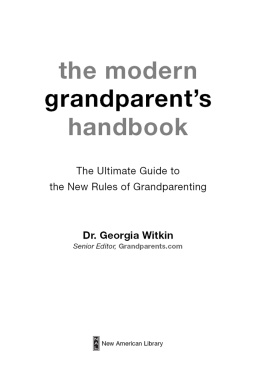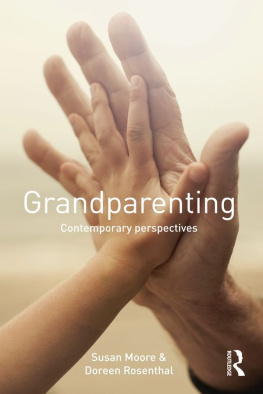Grandparents in a Digital Age
Grandparents in a Digital Age
The Third Act
Laura Tropp
LEXINGTON BOOKS
Lanham Boulder New York London
Published by Lexington Books
An imprint of The Rowman & Littlefield Publishing Group, Inc.
4501 Forbes Boulevard, Suite 200, Lanham, Maryland 20706
www.rowman.com
Unit A, Whitacre Mews, 26-34 Stannary Street, London SE11 4AB
Copyright 2019 by The Rowman & Littlefield Publishing Group, Inc.
All rights reserved. No part of this book may be reproduced in any form or by any electronic or mechanical means, including information storage and retrieval systems, without written permission from the publisher, except by a reviewer who may quote passages in a review.
British Library Cataloguing in Publication Information Available
Library of Congress Cataloging-in-Publication Data
Names: Tropp, Laura, author.
Title: Grandparents in a digital age : the third act / Laura Tropp.
Description: Lanham, Maryland : Lexington Books, an imprint of The Rowman & Littlefield Publishing Group, Inc., [2019] | Includes bibliographical references and index.
Identifiers: LCCN 2018044181 (print) | LCCN 2018046007 (ebook) | ISBN 9781498575799 (Electronic) | ISBN 9781498575782 (cloth : alk. paper) | ISBN 9781498575805 (pbk. : alk. paper)
Subjects: LCSH: Grandparenting. | Grandparents. | Internet--Social aspects.
Classification: LCC HQ759.9 (ebook) | LCC HQ759.9 .T76 2019 (print) | DDC 306.874/5--dc23
LC record available at https://lccn.loc.gov/2018044181
 TM The paper used in this publication meets the minimum requirements of American National Standard for Information Sciences Permanence of Paper for Printed Library Materials, ANSI/NISO Z39.48-1992.
TM The paper used in this publication meets the minimum requirements of American National Standard for Information Sciences Permanence of Paper for Printed Library Materials, ANSI/NISO Z39.48-1992.
Printed in the United States of America
To Charles and Carol Tropp,
whose own Third Act was the inspiration for this book.
Acknowledgments
This book would not have been possible without the guidance and assistance of many people. I would like to thank my colleagues at Marymount Manhattan College for their support throughout this process. In particular, I thank Peter Schaefer, Jenny Dixon, Eileen Doherty, Katherine Wood, Katie LeBesco, and Sarah Nelson Wright.
Thanks to Lexington Books for their support of this book, and especially Lindsey Falk and Judith Lakmper for their commitment to this work. Thank you to the reviewers, who provided valuable feedback and made this a stronger book. Thanks to Meredith Jose for her constant optimism and helpful suggestions whenever I needed them and Jess Gorman for being my enthusiastic writing buddy. I also would like to thank all the grandparents I met throughout this process, in formal interviews, at train stations, at zoos, and on streets, who were delighted to share their stories.
In my home, books are always family endeavors. I thank Ethan, Maya, and Gillian for occupying themselves when mom was working on her book. I am in debt to my father, Charlie, for his devotion to the citations, references, and index. I am grateful to my mother, Carol, for her time engaged in the act of grandparenting so I could write about it. I owe much gratitude to my sisters, Jennifer and Deborah, for their wise counsel on all things child and research related. Finally, I thank Michael, my partner and faithful editor, whose constant support and dedication to this project made it possible.
Introduction
Age as Superpower
Kenneth Harmon is an elderly man and grandfather in Oklahoma, but he is more recognizable throughout social media as poor Papaw. He received national attention when he made a hamburger dinner for his grandchildren and only one showed up. After his sad picture, which his grandchild posted on Twitter, went viral with over 180,000 retweets, the grandchildren hosted a follow-up barbecue. People drove from all over the country to eat with Papaw, take a picture with him, and buy an I ate a burger with Sad Papaw T-shirt. Papaws journey from an unknown, private grandpa to a celebrated public grandpa mirrors the power shifts of grandparenting over time. Depending on the group, the period, and the family, grandparents have been powerful patriarchs and matriarchs, reliable second parents, dependents, burdens, or community figures, like Papaw. This book investigates the history of grandparenting and the changing depiction of grandparent culture from old to hip. The chapters that follow explore the development of the celebrity grandparent, the emergence of media technologies that allow for new communication and relationships between grandparents and their grandchildren, new rituals associated with grandparenting, the growth of the marketing of grandparenting as a new stage of life, and the impact on our culture of the commodification of grandparenting.
Prior to the twentieth century, within the United States the idea of the modern grandparent likely did not even exist. Many people did not live long enough to reach the grandparent stage of life. In fact, since death was likely in childhood and adult life was arduous, someone managing to survive to an old age was respected for just this achievement. Grandparents were dependent on the younger generation for eventual care and sustenance, and younger people relied on their grandparents for support, and in wealthier classes, inheritance. Early involvement in grandparenting not only helped to preserve the family; in some ways it was the final achievement of being a parent.
In the United States, as migration patterns changed, so did family life. People began to live longer, and extended families became more separated by distance. The matriarchs and patriarchs, once revered figures within a household, often shifted to the periphery of the family. Gone were the days when families were dependent on the eldest male to pass on property or when the female matriarch was an essential figure for caregiving and advice. Instead, experts began warning parents not to listen to an interfering grandma.
Economic challenges have returned adult children, often with their own children, to their parents homes. Conversely, the elderly, living longer and needing more care, are sometimes moving into the households of their children. Unlike the stereotypical image of the elderly grandparent knitting on a rocking chair, grandparents today are active; they engage in sporting activities, take teens shopping, and join their grandkids in the latest hobbies, such as video games or social media. In Philadelphia, for example, crowds cheered for the last person to finish a race because it was a world record for Ida Keeling, a centenarian. Her daughter Shelley oversaw her mothers race, including taking out her hearing aids to avoid distractions. In news coverage of the event, she discussed how she entered her mother in her first race when the elderly lady was in her sixties. Instead of being cared for himself, he has transformed into a more universal grandfather figure for these babies and for the public, which embraced these stories about him.
The legacy of feminism also is reshaping grandparents, as some women who once balanced work and family with careers now have the chance in retirement to completely focus on their grandchildren. Millennials entering parenthood while working within the United States need the support of grandparents to solve childcare challenges. It used to be that kids would participate in adopt-a-grandparent programs to foster bonding with the aging community. Now, new parents sometimes adopt a grandparent in order to help raise their family. Many grandparents are absorbing some of the second shift caregiving as described by sociologist Arlie Hochschild.











 TM The paper used in this publication meets the minimum requirements of American National Standard for Information Sciences Permanence of Paper for Printed Library Materials, ANSI/NISO Z39.48-1992.
TM The paper used in this publication meets the minimum requirements of American National Standard for Information Sciences Permanence of Paper for Printed Library Materials, ANSI/NISO Z39.48-1992.